For Chicago’s savviest investors, there was only one place to be on Nov. 2: Chicago’s premier investment ideas conference, Invest For Kids, was held at the Harris Theater in downtown Chicago. The Invest For Kids conference brings together heavy hitters from the asset management industry from around the country to present investable ideas and broad macro trends and perspectives to an audience of investment professionals and student guests from across the Chicago area, and increasingly, the nation. The conference, through ticket sales and sponsorships, raises funds for children’s charities throughout Chicago, with focus on directing donations to organizations that support childhood and young adult learning and development in underserved and neglected communities. The event this year raised roughly $1.6 million dollars, 100 percent of which is given as grants to selected community organizations that support the Invest For Kids mission. The conference, in its ninth year, has collected donations totaling greater than $11.5 million dollars.
If you missed Invest for Kids this year, here are key takeaways from some of the powerhouse speakers who shared their investment ideas at the conference:
Rajiv Jain, GQG Partners
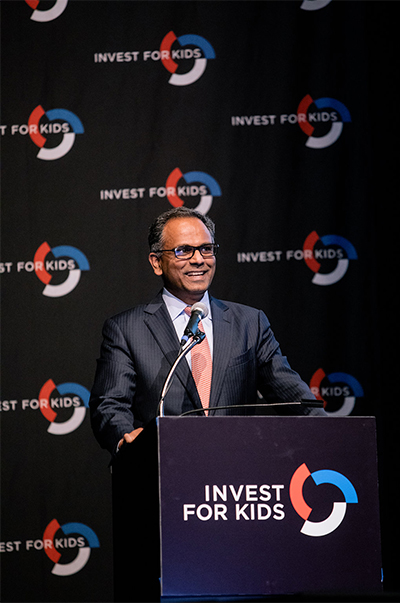
Investment Recommendation (Long): Sberbank of Russia
Why: Sberbank is benefiting from investments in their own technology, industry consolidation, and provides excellent upside if commodity inflation occurs. Dividend could grow to 7-8 percent.
Rick Rieder, BlackRock
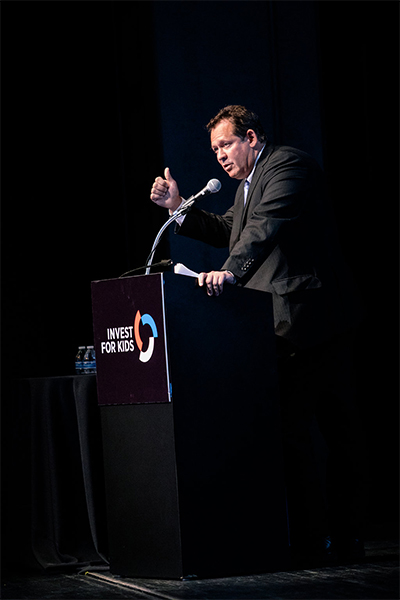
Investment Recommendation (Long): EM Debt
Why: Demand for fixed income massively outstrips supply and EM debt is rising as inflation is tempering. EM demographics are also supportive of EM debt rally.
Jimmy Levin, Oz Management
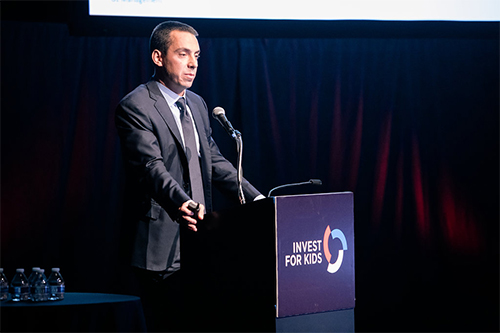
Investment Recommendation (Long): Big 4 Chinese Banks (CCB, BOC, ICBC, ABC)
Why: Chinese banks are currently trading at low valuations, have high RoE, concerns are overstated, and improving conditions will drive growth.
Mathew Klody, MCN Capital Management
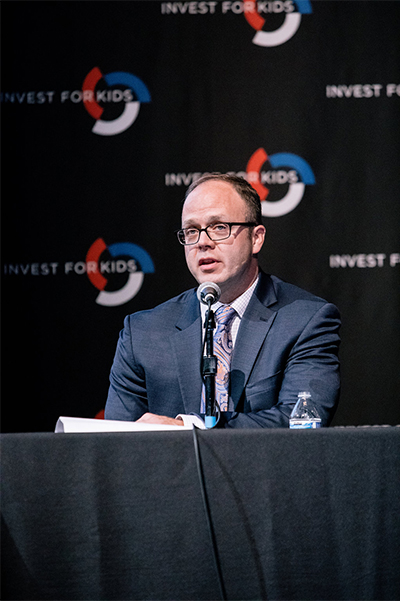
Investment Recommendation (Short): Domino’s Pizza
Why: Domino’s Pizza was the first mover in the delivery space, leveraging technology to entice consumers to order Dominos versus competitors. The first mover advantage has been dwindling as other food delivery services, both prepared and grocery, “disrupt the disruptor.”
Seth Singerman, Singerman Real Estate
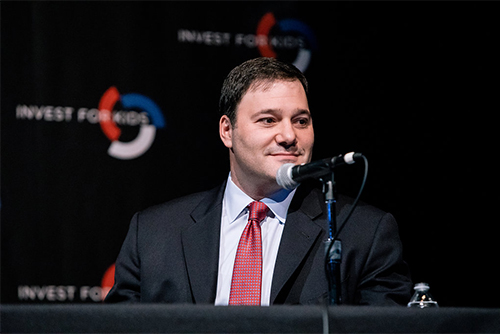
Investment Recommendation (Long): Washington Prime Group
Why: WPG is not well covered by Wall Street analysts and has a general perception that its properties are significantly worse than reality. As the name becomes more understood, stock should rally.
Dmitry Balyasny, Balyasny Asset Management
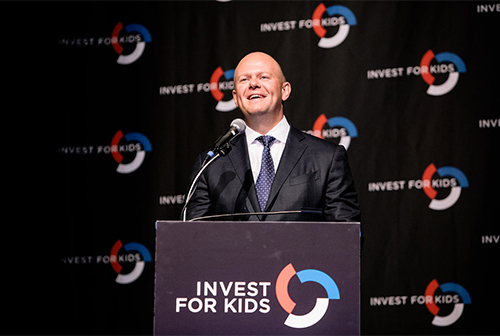
Investment Recommendation (Long): Hertz Global Holdings, Inc.
Why: Impact of ride-sharing services is overstated. As Hertz has right-sized its fleet and increases margins and FCF balance sheet, restructuring and stock buybacks should be forthcoming. Rental volumes are rising. Forty-four percent short interest could also be a momentum catalyst if stock continues upward trend.
Amos Meron, Empyrean Capital Partners
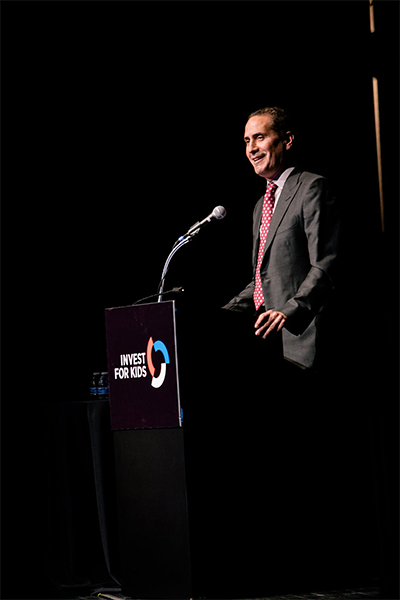
Investment Recommendation (Long): Seritage Growth Properties
Why: Seritage is too closely associated with Sears, as Seritage properties were spun out of Sears. The properties are undervalued due to this association — they’re actually premiere properties in premiere locations. Leases are being diversified from Sears stores to higher rent, higher-quality tenants. Due to market misperception as a result of the Sears association, the stock is currently undervalued.
In addition to the above manager recommendations, the Invest For Kids conference held two fireside chats.
The first, between Sam Zell and Jonathan Lit, covered the current market for retail real estate and whether or not it was time to “catch a falling knife in the sector.” Both agreed that prime, high-end retail is doing well while the rest of the sector continues to struggle. Mr. Zell also discussed the rise of exchange-traded funds (ETFs) and passive investing. He opined that passive investors cannot truly be owners of companies, and the rise of ETF investing allows for bad companies to get away with poor management. Mr. Zell also discussed that a company he controls, Equity Commonwealth, has bought nothing in the past four years and has built a $3 billion dollar cash position to take advantage of future opportunities.
The second fireside chat was between Arne Duncan, of the Emerson Collective and former secretary of education and CEO of Chicago Public Schools, and Michael Sacks, of GCM Grosvenor and chair of World Business Chicago. Mr. Duncan discussed how Chicago is challenged by lack of educational and economic opportunity. He shared his pragmatic approach to education, be it public, private, charter, or for profit, explaining that his concern is with outcomes, not labels, and outcomes must improve. Mr. Duncan also noted that our democracy is “fraying on the edges,” less due to race or class but more as a result of disparity in education. Mr. Duncan challenged the audience to “move outside their comfort zone” and be willing to assist in giving the most at-risk young adults in Chicago job opportunities in their firms. Mr. Sacks discussed how employers must embrace at-risk youth and offer opportunities for development outside of traditional education and job training programs.
Finally, the conference closed with a presentation by Bart Stephens of Blockchain Capital. Mr. Stephens discussed three main things. First he discussed the popular question as to whether or not Bitcoin is trading at bubble levels. His basic thesis was that at current levels it is not because its rise has not been driven by speculative leverage, a hallmark of nearly all historical bubbles. Second, Mr. Stephens discussed blockchain technology, the distributed ledger, that is the backbone of Bitcoin and other “tokens.” The blockchain technology cannot be “uninvented” and the companies his firm is investing in are searching for ways to remake many sectors of the economy using the security and efficiency of the technology. Finally, Mr. Stevens addressed the regulation of Bitcoin (yes, it’s legal), as well as Initial Coin Offerings (ICOs) and the ability for companies to access capital faster, and with democratized access.
More from Make It Better:
- Why You Absolutely Need an Emergency Fund
- 3 Financial Tips for Parents of Boomerang Kids
- How to Protect Aging Parents From Identity Theft and Financial Fraud
Joshua Streckert is the founder and managing partner of SJ Equity Partners, L.P., a private investment partnership focusing on short-term long/short equity-trading strategies. Previously he worked in fixed-income derivatives trading, valuations, and risk management for Lehman Brothers and Bank of America. A graduate of Northwestern University, he is passionate about supporting his alma mater, as well as the American Red Cross.

